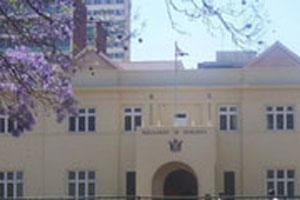
Last week, we noted some of the discouraging developments regarding the establishment of the National Peace and Reconciliation Commission (NPRC).
Dzikamai Bere and Prosper Maguchu
Sadly, we saw that the persons we elected to Parliament are the people shortchanging us and trying to sell us a dummy for a peace commission.
But this is not new in Zimbabwe. And yet there comes a time in the life of a nation when a new generation that sincerely hungers for peace must interrupt a defective process and set the society on a new path.
We will be naïve to expect the current administration to suddenly allow a genuine commission to investigate its past.
It has never happened before. We make reference to the Dumbutshena Commission of Inquiry of 1981, the Chihambakwe Committee of Inquiry of 1984, and arguably, the Organ on National Healing Reconciliation and Integration.
This history makes our fears of a stillbirth for the commission well-justified.
However, there are a number of things that progressive elements of the government and peace-loving citizens can do, so that the noble goals of the NPRC are achieved.
- Chamisa under fire over US$120K donation
- Mavhunga puts DeMbare into Chibuku quarterfinals
- Pension funds bet on Cabora Bassa oilfields
- Councils defy govt fire tender directive
Keep Reading
First, the Parliament of Zimbabwe must revisit the manner in which they have set out to establish the NPRC. We mentioned the advantages of a more inclusive process.
We must be forgiven for wondering where the other progressive parliamentarians are when this national fraud is brewing.
Shouldn’t they defend the interests of victims who today can no longer speak for themselves and push for a truly inclusive process?
Secondly, it is important for the government to grasp the important fact that peace commissions are only one part of a comprehensive transitional justice strategy and should be considered together with possible initiatives towards prosecutions, reparations, vetting and other accountability or reform programmes.
A truly independent commission is most likely to recommend some of these measures, hence it becomes necessary that there exist the infrastructure to support the work of the commission and the aftermath. In this area we have so much to learn and unlearn from South Africa.
Thirdly, a commission’s work should coincide with clear operational independence. The legitimacy and public confidence that are essential for a successful commission depend on its ability to carry out its work without political interference.
Once established, the commission should operate free of direct or indirect influence by the government, including in its research and investigations, budgetary decision-making, and in its report and recommendations. Political authorities should give clear signals that the commission will be operating independently right from the onset.
The fourth point is that the mandate should be broad to cover all important violations. It is most likely that the NPRC will be restricted to investigate civil and political rights related to the physical integrity of a person such as torture, abductions and murder.
It does not include economic aspects of human rights violations such as Operation Murambatsvina and the harmful activities of the Central Bank’s quasi fiscal operations.
In the fifth place; according to the UN and the best practices globally, the process and timing of selecting the commissioners are key. First, commissioners should not be appointed until the commission’s terms of reference have been set.
Past attempts to jump-start the process through the swift appointment of commissioners, such as immediately following the conclusion of a peace agreement, have instead greatly weakened the prospects for an effective and widely respected commission.
The terms of reference should spell out the process for selection and the general qualities or characteristics of the ideal commissioners.
The UN rules are against appointing political leaders or representatives of political parties, factions or former armed groups on the commission.
A number of civil society organisations in consultation with survivors of human rights violations have produced excellent papers on the legal framework for the NPRC. These, if made use of, may fill in the existing gaps in the parliament’s defective process.
Finally, we must emphasise that the State does not have a monopoly on investigating the truth. When it becomes clear that the State is determined to alienate the people from the process, there are, of course, other possible means of addressing the past, including through inquiries by non-governmental organisations (NGOs) or locally-based processes that are less formalised than a national truth commission, like in Guatemala.
Disappointed by the government’s silence on the two enquiries mentioned earlier on, two human rights organisations, the Legal Resources Foundation (LRF) and the Catholic Commission for Justice and Peace (CCJP) embarked on a separate truth enquiry in 1987.
Similarly, in November 2008 the International Labour Organisation (ILO) decided to set up a Commission of Inquiry to contribute to the process of reconciliation and healing in Zimbabwe on the basis of international standards on labour relations and human rights.
Another example was the UN investigation into Operation Murambatsvina through special envoy Anna Tibaijuka’s fact finding mission.
The selection process adopted by the Parliament is contrary to international standards and the expectations of the many survivors of past wrongs.
If the State can address the shortfalls highlighted here, the NPRC can stand a good chance of delivering on its mandate to ensure post-conflict justice, healing and reconciliation.
Dzikamai Bere and Prosper Maguchu contribute to this column in their individual capacities. The views contained here are not the views of the organisations they are associated with.










